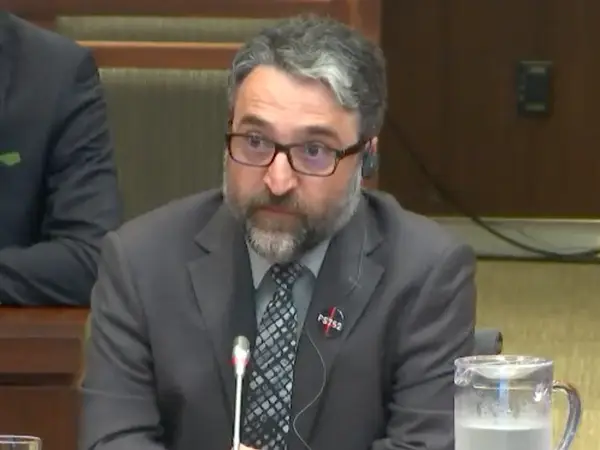Canada's international human rights parliamentary subcommittee has criticized the government's “passive” approach toward Iran’s widespread human rights abuses.
The meeting of the House of Commons subcommittee was held on Tuesday and attended by several political and human rights activists – including the spokesman of the Association of Families of Flight PS752 Victims, Hamed Esmaeilion.
Kasra Aarabi, a senior analyst in the Extremism Policy Unit at the Tony Blair Institute for Global Change, who specializes in Iran and Shiite Islamist Extremism, said that currently Revolutionary Guard officers have key administerial roles in the government of President Ebrahim Raisi, which seeks to consolidate the Islamic Republic’s grip across the Middle East. “Raisi is mandated to purify the regime,” he said, adding that the IRGC is the force behind this change.
He mentioned Interior Minister Ahmad Vahidi – an IRGC general wanted by Interpol for his suspected role in the 1994 AMIA Jewish center bombing in Argentina that killed 85 people and injured over 300 – and Foreign Minister Hossein Amir-Abdollahian – for his alleged affiliation with IRGC’s Quds Force – as examples of such appointments.
“Domestically, the IRGC is preparing to unleash a new wave of Islamization on the Iranian people to eradicate Western and Persian aspects of the Iranian society,” he said, noting that the majority of Iranians want a secular government, manifested on the streets with protests “growing in size and scale.”
“The 1999 unrest took place in three cities and seven people were killed. In 2009, protests were in 10 cities and around 100 people were killed. Iran’s protests in November 2019, however, saw protests in over 100 towns and cities and as many as 1,500 civilians were killed in just a few days,” he added. “Canada can and should support the Iranian people,” he concluded.
Author Maral Karimi said social instability in Iran is going to get worse in the foreseeable future, highlighting that “Canada’s commitment to democracy within its borders and beyond make it a moral and political imperative to support the organic and democratic movements” such as protests by Iranian teachers, drivers, laborers, and other sectors of the society.
Kylie Moore-Gilbert, an academic previously jailed in Iran for over two years, also recounted her ordeal at the hands of IRGC in Islamic Republic’s prisons, as well as gross violations of human rights towards Iranian political prisoners.
Ali Ehsassi, a member of the House of Commons, underlined that the Revolutionary Guards are responsible for many horrific developments in the Middle East and the repression of civil society in Iran.
Another member of the House, Arnold Viersen, also criticized the government for not designating the Revolutionary Guards as a terrorist organization and not taking any specific action to hold it accountable for its crimes, including the intentional downing of the Ukraine Airlines Flight PS752.
The airliner was shot down by two air-defense missiles fired by the IRGC on January 8, 2020, as it took off from Tehran’s Imam Khomeini International Airport.
Esmaeilion, who lost his wife and daughter in the plane crash and has been campaigning for justice for the families of the victims ever since, said that 30 months have passed since the IRGC committed this “heinous crime over the skies of Tehran”, criticizing “Canada’s tepid and cautious approach to pursuing justice against the government of Iran.”
Not only has the Islamic Republic refused to cooperate to shed light on the incident, but also “it has systematically lied and misled to successfully impede the emergence of the factual matrix that led to this crime,” he said.
"Apart from deliberately obfuscating [the investigations], the Iranian government and the IRGC have subjected the relatives of the victims to crushing psychological pressure,” Esmaeilion said.
